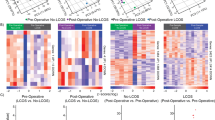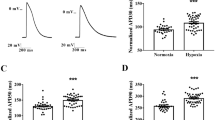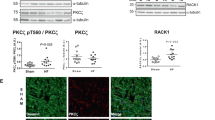Abstract
Background:
Evaluations of stress-induced cardiac functional alterations in adults after neonatal glucocorticoid (GC) treatment have been limited. In the present study, we evaluated adult cardiac functional recovery during postischemic reperfusion and measured cardiac gene expression involved energy metabolism in rats neonatally treated with dexamethasone (DEX).
Method:
Male Wistar rats were injected DEX in first 3 d after birth and controls were received saline (SAL). At 24 wk of age, insulin tolerance tests were performed, plasma lipid levels were measured, and left ventricular function and myocardial infarct size were evaluated. Expressions of genes involved in cardiac energy metabolism were measured by quantitative real-time polymerase chain reaction (PCR) and western blot.
Results:
In 24-wk-old rats, neonatal DEX administration caused dyslipidemia, impaired cardiac recovery function and increased size of infarction, decreased cardiac expression of glucose transporter 4(GLUT4), peroxisome proliferative-activated receptor gamma coactivator 1α (PGC-1α) and ratios of phospho-forkhead box O1/forkhead box O1 (p-FoxO1/FoxO1) and phospho AMP-activated protein kinase/AMP-activated protein kinase (p-AMPK/AMPK) but increased pyruvate dehydrogenase kinase isoenzyme 4 (PDK4) expression compared with controls.
Conclusion:
Neonatal DEX administration impairs cardiac functional recovery during reperfusion following ischemia in 24-wk-old rats. Reduced cardiac glucose utilization may contribute to the long-term detrimental effects caused by neonatal DEX treatment.
Similar content being viewed by others
Log in or create a free account to read this content
Gain free access to this article, as well as selected content from this journal and more on nature.com
or
References
Liu Y, van Goor H, Havinga R, et al. Neonatal dexamethasone administration causes progressive renal damage due to induction of an early inflammatory response. Am J Physiol Renal Physiol 2008;294:F768–76.
Yeh TF, Lin YJ, Huang CC, et al. Early dexamethasone therapy in preterm infants: a follow-up study. Pediatrics 1998;101:E7.
Niu Y, Herrera EA, Evans RD, Giussani DA. Antioxidant treatment improves neonatal survival and prevents impaired cardiac function at adulthood following neonatal glucocorticoid therapy. J Physiol 2013;591:5083–93.
Santos MS, Joles JA. Early determinants of cardiovascular disease. Best Pract Res Clin Endocrinol Metab 2012;26:581–97.
Bal MP, de Vries WB, van Oosterhout MF, et al. Long-term cardiovascular effects of neonatal dexamethasone treatment: hemodynamic follow-up by left ventricular pressure-volume loops in rats. J Appl Physiol (1985) 2008;104:446–50.
Harmancey R, Vasquez HG, Guthrie PH, Taegtmeyer H. Decreased long-chain fatty acid oxidation impairs postischemic recovery of the insulin-resistant rat heart. FASEB J 2013;27:3966–78.
Schwarz K, Siddiqi N, Singh S, Neil CJ, Dawson DK, Frenneaux MP. The breathing heart - mitochondrial respiratory chain dysfunction in cardiac disease. Int J Cardiol 2014;171:134–43.
Turdi S, Ge W, Hu N, Bradley KM, Wang X, Ren J. Interaction between maternal and postnatal high fat diet leads to a greater risk of myocardial dysfunction in offspring via enhanced lipotoxicity, IRS-1 serine phosphorylation and mitochondrial defects. J Mol Cell Cardiol 2013;55:117–29.
Liu Y, Havinga R, Bloks VW, et al. Postnatal treatment with dexamethasone perturbs hepatic and cardiac energy metabolism and is associated with a sustained atherogenic plasma lipid profile in suckling rats. Pediatr Res 2007;61:165–70.
ter Wolbeek M, de Sonneville LM, de Vries WB, et al. Early life intervention with glucocorticoids has negative effects on motor development and neuropsychological function in 14-17 year-old adolescents. Psychoneuroendocrinology 2013;38:975–86.
Liu Y, Van Der Leij FR. Long-term effects of neonatal treatment with dexamethasone, L-carnitine, and combinations thereof in rats. Pediatr Res 2011;69:148–53.
Bal MP, de Vries WB, Steendijk P, et al. Histopathological changes of the heart after neonatal dexamethasone treatment: studies in 4-, 8-, and 50-week-old rats. Pediatr Res 2009;66:74–9.
O’Brien K, Sekimoto H, Boney C, Malee M. Effect of fetal dexamethasone exposure on the development of adult insulin sensitivity in a rat model. J Matern Fetal Neonatal Med 2008;21:623–8.
Greene NH, Pedersen LH, Liu S, Olsen J. Prenatal prescription corticosteroids and offspring diabetes: a national cohort study. Int J Epidemiol 2013;42:186–93.
Adigun AA, Wrench N, Seidler FJ, Slotkin TA. Neonatal dexamethasone treatment leads to alterations in cell signaling cascades controlling hepatic and cardiac function in adulthood. Neurotoxicol Teratol 2010;32:193–9.
Elmes MJ, Gardner DS, Langley-Evans SC. Fetal exposure to a maternal low-protein diet is associated with altered left ventricular pressure response to ischaemia-reperfusion injury. Br J Nutr 2007;98:93–100.
Calvert JW, Lefer DJ, Gundewar S, Poston L, Coetzee WA. Developmental programming resulting from maternal obesity in mice: effects on myocardial ischaemia-reperfusion injury. Exp Physiol 2009;94:805–14.
Wong IH, Digby AM, Warren AE, Pepelassis D, Vincer M, Chen RP. Dexamethasone given to premature infants and cardiac diastolic function in early childhood. J Pediatr 2011;159:227–31.
de Vries WB, Karemaker R, Mooy NF, et al. Cardiovascular follow-up at school age after perinatal glucocorticoid exposure in prematurely born children: perinatal glucocorticoid therapy and cardiovascular follow-up. Arch Pediatr Adolesc Med 2008;162:738–44.
Bal MP, de Vries WB, van der Leij FR, et al. Neonatal glucocorticosteroid treatment causes systolic dysfunction and compensatory dilation in early life: studies in 4-week-old prepubertal rats. Pediatr Res 2005;58:46–52.
Qi Y, Xu Z, Zhu Q, et al. Myocardial loss of IRS1 and IRS2 causes heart failure and is controlled by p38α MAPK during insulin resistance. Diabetes 2013;62:3887–900.
Nagendran J, Pulinilkunnil T, Kienesberger PC, et al. Cardiomyocyte-specific ablation of CD36 improves post-ischemic functional recovery. J Mol Cell Cardiol 2013;63:180–8.
Lucchinetti E, Wang L, Ko KW, et al. Enhanced glucose uptake via GLUT4 fuels recovery from calcium overload after ischaemia-reperfusion injury in sevoflurane- but not propofol-treated hearts. Br J Anaesth 2011;106:792–800.
Cheng Z, White MF. Targeting Forkhead box O1 from the concept to metabolic diseases: lessons from mouse models. Antioxid Redox Signal 2011;14:649–61.
Puthanveetil P, Wan A, Rodrigues B. FoxO1 is crucial for sustaining cardiomyocyte metabolism and cell survival. Cardiovasc Res 2013;97:393–403.
Battiprolu PK, Hojayev B, Jiang N, et al. Metabolic stress-induced activation of FoxO1 triggers diabetic cardiomyopathy in mice. J Clin Invest 2012;122:1109–18.
Kim M, Tian R. Targeting AMPK for cardiac protection: opportunities and challenges. J Mol Cell Cardiol 2011;51:548–53.
Jäger S, Handschin C, St-Pierre J, Spiegelman BM. AMP-activated protein kinase (AMPK) action in skeletal muscle via direct phosphorylation of PGC-1alpha. Proc Natl Acad Sci USA 2007;104:12017–22.
Yan W, Zhang H, Liu P, et al. Impaired mitochondrial biogenesis due to dysfunctional adiponectin-AMPK-PGC-1α signaling contributing to increased vulnerability in diabetic heart. Basic Res Cardiol 2013;108:329.
Ansley DM, Wang B. Oxidative stress and myocardial injury in the diabetic heart. J Pathol 2013;229:232–41.
Rhodes SS, Camara AK, Heisner JS, Riess ML, Aldakkak M, Stowe DF. Reduced mitochondrial Ca2+ loading and improved functional recovery after ischemia-reperfusion injury in old vs. young guinea pig hearts. Am J Physiol Heart Circ Physiol 2012;302:H855–63.
Lee YY, Lee HJ, Lee SS, et al. Taurine supplementation restored the changes in pancreatic islet mitochondria in the fetal protein-malnourished rat. Br J Nutr 2011;106:1198–206.
Lu Z, Xu X, Hu X, et al. PGC-1 alpha regulates expression of myocardial mitochondrial antioxidants and myocardial oxidative stress after chronic systolic overload. Antioxid Redox Signal 2010;13:1011–22.
Leone TC, Kelly DP. Transcriptional control of cardiac fuel metabolism and mitochondrial function. Cold Spring Harb Symp Quant Biol 2011;76:175–82.
Sihag S, Cresci S, Li AY, Sucharov CC, Lehman JJ. PGC-1alpha and ERRalpha target gene downregulation is a signature of the failing human heart. J Mol Cell Cardiol 2009;46:201–12.
Riehle C, Abel ED. PGC-1 proteins and heart failure. Trends Cardiovasc Med 2012;22:98–105.
Mitra R, Nogee DP, Zechner JF, et al. The transcriptional coactivators, PGC-1α and β, cooperate to maintain cardiac mitochondrial function during the early stages of insulin resistance. J Mol Cell Cardiol 2012;52:701–10.
Whittington HJ, Hall AR, McLaughlin CP, Hausenloy DJ, Yellon DM, Mocanu MM. Chronic metformin associated cardioprotection against infarction: not just a glucose lowering phenomenon. Cardiovasc Drugs Ther 2013;27:5–16.
Postnatal corticosteroids to treat or prevent chronic lung disease in preterm infants. Pediatrics 2002;109:330–8.
Author information
Authors and Affiliations
Corresponding author
Rights and permissions
About this article
Cite this article
Jiang, X., Ma, H., Li, C. et al. Effects of neonatal dexamethasone administration on cardiac recovery ability under ischemia-reperfusion in 24-wk-old rats. Pediatr Res 80, 128–135 (2016). https://doi.org/10.1038/pr.2016.54
Received:
Accepted:
Published:
Issue date:
DOI: https://doi.org/10.1038/pr.2016.54



